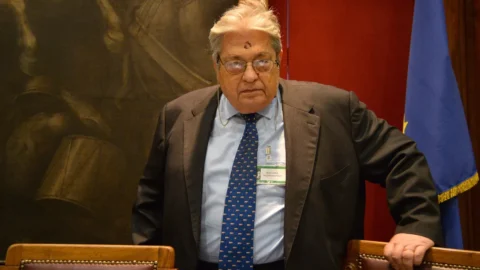"France and Italy prevented the Grexit that Germany wanted but the price is a half-way political victory and the renunciation of further advances in European political construction and economic governance": the speaker in this interview with FIRSTonline is Stefamo Micossi, director general of Assonime (the association of joint-stock companies) and always pro-European. Which he adds: "It matters little that the reforms that are imposed on Greece are well justified but the brutality of the method ends up killing merit". According to Micossi, the only alternative to truly relaunch Europe would be to hand over shares of national sovereignty to the European institutions, but no one is ready to do so.
FIRST online – Dr Micossi, how do you evaluate the agreement reached with difficulty by the Eurosummit on Greece and what do you expect its effects to be?
FIRST online – Are you thinking about Germany?
MICOSSI – In Germany, the opinion has now become established that Greece is "infecting" the monetary union and that the infection is not curable until Greece is kicked out. Hence the proposal to expel them, which was real, providing the necessary assistance to address the humanitarian emergency. France and Italy got in the way.
FIRST online – If this is the case, how can one say that Europe is German-led?
MICOSSI – In defending Greece, France has also defended its own "exceptional nature": its deficit is always above 3 per cent, but Germany turns a blind eye, and with it the European Commission too, which knows that someone in the pigsty among pigs it is Orwellian a little less equal. Italy sided with her. The price is clear: there is a semi-political victory (it is not known whether Greece can really do what it has pledged to do, if it doesn't, it will be expelled anyway), but there is also the renunciation of further advances in political construction and economic governance. With Greece inside the Eurozone, progress on the issues of risk sharing on public debts and a common fiscal capacity of the Eurozone will not be talked about for long.
FIRST online – Beyond the political unknowns concerning Greece and its rapid parliamentary approval of the reforms, on a strictly economic level will the agreement put Athens back on the path of recovery and growth?
MICOSSI – It matters little that many of the reforms being imposed on Greece today are well justified on the merits. The brutality of the method ends up killing the merit. A serious discussion on the future of the Eurozone and the Union can no longer be postponed. The problem is that the intergovernmental method can only be abandoned by agreeing to entrust essential components of sovereignty in economic and social policies to common institutions. But neither France nor Italy are ready to do it. There is a need for serious and open-minded reflection, in the face of increasingly bewildered European public opinion.
FIRST online – At this point, what will be the effects of the Eurosummit agreement on Greece?
MICOSSI – The only alternative to stopping Grexit was to write a super-strict programme, humiliating Greece twice: because they had to accept everything they promised their voters never to accept – cutting pensions, raising of VAT, privatizations, a list of liberalizations that not even Mrs Thatcher would have imagined, and so on reforming; and because the program will be verified on the spot by the odious Troika, the International Monetary Fund having been persuaded to participate in the new financing, therefore to help write and monitor the adjustment programme. The inspectors will soon be in Athens; the implementation of the program will in fact be managed by commissioners who have come from abroad, behind the fig leaf of technical assistance.
It seems unlikely to me that Tsipras could survive such a turnaround; thus, at least Germany's subordinate goal, which visibly was to replace the incumbent government with a less unreliable one, possibly with broad parliamentary support (national unity), will be achieved.





